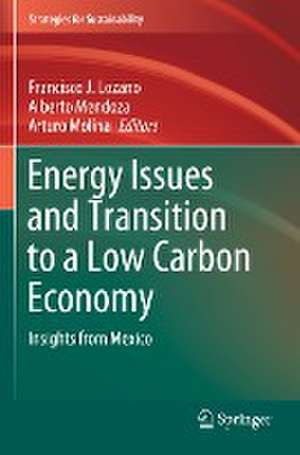Energy Issues and Transition to a Low Carbon Economy: Insights from Mexico: Strategies for Sustainability
Editat de Francisco J. Lozano, Alberto Mendoza, Arturo Molinaen Limba Engleză Paperback – 12 aug 2022
Several human knowledge disciplines and topics are covered in the book, including public policy, economics, transboundary issues, electricity and thermal energy, residual biomass use, distributed energy systems and its management, and decision-making tools.
An analysis is considered regarding energy issues interaction in the Mexican-USA border, which differ in both countries from pricing and policy, and the work and research that has been developed for transboundary energy trade.
| Toate formatele și edițiile | Preț | Express |
|---|---|---|
| Paperback (1) | 641.71 lei 6-8 săpt. | |
| Springer International Publishing – 12 aug 2022 | 641.71 lei 6-8 săpt. | |
| Hardback (1) | 788.54 lei 6-8 săpt. | |
| Springer International Publishing – 11 aug 2021 | 788.54 lei 6-8 săpt. |
Din seria Strategies for Sustainability
- 18%
 Preț: 784.48 lei
Preț: 784.48 lei - 18%
 Preț: 1118.30 lei
Preț: 1118.30 lei - 20%
 Preț: 481.05 lei
Preț: 481.05 lei - 18%
 Preț: 719.76 lei
Preț: 719.76 lei - 18%
 Preț: 774.83 lei
Preț: 774.83 lei - 18%
 Preț: 958.38 lei
Preț: 958.38 lei - 20%
 Preț: 752.70 lei
Preț: 752.70 lei - 15%
 Preț: 642.51 lei
Preț: 642.51 lei - 18%
 Preț: 889.29 lei
Preț: 889.29 lei - 18%
 Preț: 1232.09 lei
Preț: 1232.09 lei - 18%
 Preț: 953.35 lei
Preț: 953.35 lei - 15%
 Preț: 643.48 lei
Preț: 643.48 lei - 18%
 Preț: 1114.65 lei
Preț: 1114.65 lei - 19%
 Preț: 479.84 lei
Preț: 479.84 lei - 23%
 Preț: 605.18 lei
Preț: 605.18 lei - 20%
 Preț: 929.07 lei
Preț: 929.07 lei - 24%
 Preț: 632.64 lei
Preț: 632.64 lei - 15%
 Preț: 642.83 lei
Preț: 642.83 lei -
 Preț: 395.33 lei
Preț: 395.33 lei - 18%
 Preț: 901.74 lei
Preț: 901.74 lei - 18%
 Preț: 1389.15 lei
Preț: 1389.15 lei - 18%
 Preț: 779.26 lei
Preț: 779.26 lei - 24%
 Preț: 793.38 lei
Preț: 793.38 lei - 15%
 Preț: 635.15 lei
Preț: 635.15 lei
Preț: 641.71 lei
Preț vechi: 754.95 lei
-15% Nou
Puncte Express: 963
Preț estimativ în valută:
122.81€ • 127.74$ • 101.38£
122.81€ • 127.74$ • 101.38£
Carte tipărită la comandă
Livrare economică 14-28 aprilie
Preluare comenzi: 021 569.72.76
Specificații
ISBN-13: 9783030756635
ISBN-10: 3030756637
Pagini: 307
Ilustrații: XIV, 307 p. 112 illus., 93 illus. in color.
Dimensiuni: 155 x 235 mm
Greutate: 0.45 kg
Ediția:1st ed. 2022
Editura: Springer International Publishing
Colecția Springer
Seria Strategies for Sustainability
Locul publicării:Cham, Switzerland
ISBN-10: 3030756637
Pagini: 307
Ilustrații: XIV, 307 p. 112 illus., 93 illus. in color.
Dimensiuni: 155 x 235 mm
Greutate: 0.45 kg
Ediția:1st ed. 2022
Editura: Springer International Publishing
Colecția Springer
Seria Strategies for Sustainability
Locul publicării:Cham, Switzerland
Cuprins
Chapter 1. Historical Context and Present Energy Uses in the Global Economy.- Chapter 2. Energy and Environmental Policy and Economic Development.- Chapter 3. Fossil Fuels Use and Efficiency During the Transition to a Low-Carbon Economy.- Chapter 4. Energy Markets Evolution in Lieu of Fossil Fuels Use and Renewables Penetration.- Chapter 5. Market Restructuring Due to Renewable Sources Evolution And Penetration.- Chapter 6. Energy Efficiency for Present Day Fossil Fuels Use. Thermodynamic Limits and Their Relation to Price Structure and Supply And Demand. Mathematical Models.- Chapter 7. National Electric Grid Planning To Use Distributed Renewables Generation And Future Market Demand.- Chapter 8. Micro-grids as Main Energy Blocks of Smart Energy Systems.- Chapter 9. Current Trends and Challenges in Sustainable Generation, Transmission and Distribution of Electricity.- Chapter 10. Residual Biomass Use for Energy Generation.- Chapter 11. Collaborative Decision-Making Centres for Sustainable Energy.- Chapter 12. Conclusions and Outlook for Strategies in Energy for Sustainability.
Textul de pe ultima copertă
Without energy, there is no well-functioning economy, besides facing social risks. This book provides a systemic approach to energy in Mexico and its relations to the USA arising from the energy reform of the former. It covers the transition from fossil fuels to a low-carbon economy, relying heavily on renewable sources and mitigating climate change risks.
Several human knowledge disciplines and topics are covered in the book, including public policy, economics, transboundary issues, electricity and thermal energy, residual biomass use, distributed energy systems and its management, and decision-making tools.
An analysis is considered regarding energy issues interaction in the Mexican-USA border, which differ in both countries from pricing and policy, and the work and research that has been developed for transboundary energy trade.
An analysis is considered regarding energy issues interaction in the Mexican-USA border, which differ in both countries from pricing and policy, and the work and research that has been developed for transboundary energy trade.
Caracteristici
Presents an energy outlook during transition to a low-carbon economy Focuses on renewable energy in the Mexican and US contexts Highlights importance of managing distributed electricity generation Emphasises decision-making in complex energy scenarios
